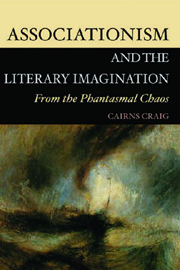Book contents
- Frontmatter
- Contents
- Acknowledgments
- Abbreviations
- Introduction: A Chain of Associations
- 1 ‘Kant has not answered Hume’: Hume, Coleridge and the Romantic Imagination
- 2 Signs of Mind and the Return of the Native: Wordsworth to Yeats
- 3 Strange Attractors and the Conversible World: Hume, Sterne, Dickens
- 4 The Mythic Method and the Foundations of Modern Literary Criticism
- 5 Chaos and Conversation: Pater, Joyce, Woolf
- 6 The Lyrical Epic and the Singularity of Literature
- Bibliography
- Index
3 - Strange Attractors and the Conversible World: Hume, Sterne, Dickens
Published online by Cambridge University Press: 12 September 2012
- Frontmatter
- Contents
- Acknowledgments
- Abbreviations
- Introduction: A Chain of Associations
- 1 ‘Kant has not answered Hume’: Hume, Coleridge and the Romantic Imagination
- 2 Signs of Mind and the Return of the Native: Wordsworth to Yeats
- 3 Strange Attractors and the Conversible World: Hume, Sterne, Dickens
- 4 The Mythic Method and the Foundations of Modern Literary Criticism
- 5 Chaos and Conversation: Pater, Joyce, Woolf
- 6 The Lyrical Epic and the Singularity of Literature
- Bibliography
- Index
Summary
When Wordsworth declared, in the ‘Preface’ to Lyrical Ballads, that ‘the principal object’ of his poems was to make ‘incidents and situations from common life’ of interest to his readers by ‘tracing in them, truly though not ostentatiously, the primary laws of our nature: chiefly as far as regards the manner in which we associate ideas in a state of excitement’ (WW, 597), he articulated an agenda that was to dominate much of literature from the early nineteenth century to the early part of the twentieth. The ‘truth’ of literature, from John Gibson Lockhart's insistence in 1817 ‘that the world of thought is the proper theatre of man’ to Virginia Woolf's effort in the 1920s to describe the ‘atoms as they fall upon the mind, the pattern … which each sight or incident scores upon the consciousness’, would increasingly depend on the adequacy with which it could represent and the delicacy with which it could analyse ever more fugitive origins and ever more complex consequences of ‘the manner in which we associate ideas in a state of excitement’. Wordsworth had been, briefly, in the 1790s, a follower of William Godwin and, as William D. Brewer has argued, one of the key innovations in the novels produced by Godwin and his circle is the way in which they ‘display the main character's inner self by recounting the ‘“series of thoughts … linked together” that form the protagonist's “personal identity”’.
- Type
- Chapter
- Information
- Associationism and the Literary ImaginationFrom the Phantasmal Chaos, pp. 135 - 180Publisher: Edinburgh University PressPrint publication year: 2007



